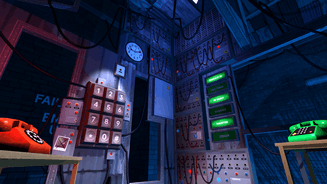William Pugh (game designer)
William Pugh is a game designer best known for his work on The Stanley Parable. In 2015, he opened an indie game development studio, Crows Crows Crows.
William Pugh | |
|---|---|
 Pugh presenting at the 2015 Game Developers Conference | |
| Occupation | Game designer |
| Known for | The Stanley Parable |
Early life and career

William Pugh's parents are art teachers. He developed an interest in video games after playing a Nintendo 64 during a hospital visit when he was six. He studied at the Leeds College of Art for two weeks, but dropped out to work on video games. Pugh taught himself video game environment design[1] through working on modifications, or mods, of video games by Valve. He made levels for Team Fortress 2, campaigns for Left 4 Dead 2, and puzzles in Portal.[2] His work earned him a Saxxy Award, a fan-voted award for Team Fortress 2-based creations.[3]
Pugh first heard of the Source engine mod of Half-Life 2 known as The Stanley Parable from Minecraft creator Markus Persson's Twitter feed. Pugh wanted to work on a larger project and so contacted the mod's creator, Davey Wreden. They decided to work on a remastered, standalone version of The Stanley Parable together. Development of the full game took two years, mainly through remote collaboration software Dropbox and Skype. Pugh started an unnamed development studio following the game's release to work on several projects, saying that "we've got the money and freedom to just go wild, so we've been doing exactly that".[2] Pugh presented on The Stanley Parable's development at the 2015 Game Developers Conference.[4] Reflecting on the game's release, he said he was less interested in the technical work of sound and texture editing, and would instead prefer to outsource those jobs to focus on writing.[5]
Crows Crows Crows

Pugh started an indie development studio, Crows Crows Crows, in October 2015.[6][7][8] The studio released an interactive teaser on its website in advance of their first game.[9]
The studio's first game was Dr. Langeskov, The Tiger, and The Terribly Cursed Emerald: A Whirlwind Heist, a free title released in December 2015. The meta-fictional game, in which the player explores and interacts with the backstage elements of a video game demonstration while waiting to play it, includes voice work from Justin Roiland, of Rick and Morty, and Simon Amstell.[10]
Crows Crows Crows has released two other games using the itch.io platform. The Magpie Collection is a series of ten short games by various developers including Pugh, compiled by the studio, which were developed following an IndieGoGo to raise money to help replace equipment stolen from several developers at the 2015 A MAZE event in Berlin.[11] The Temple of No, released in June 2016, is a text-based adventure game using the Twine platform.[12]
Roiland announced in September 2015 that he would be working on a virtual reality game for the HTC Vive with Pugh.[13] The collaboration, called Accounting, was released as a free download on Microsoft Windows in 2016. Pugh and Roiland's collaboration began after a chance Twitter conversation in September 2015. Roiland, who was in the proximity of the offices of Respawn Entertainment in California, called out on Twitter if anyone at Respawn was a fan of Rick and Morty and could give him a tour. Pugh reached out to reply, lying about working at Respawn as he was still in the United Kingdom, and offering him a tour. Pugh sent further messages to Roiland feigning that he just missed him, but eventually fessed up. Roiland recognized Pugh's name from The Stanley Parable and was impressed by the whole "weird switcheroonie". Pugh then flew out to Los Angeles where he and Justin spent a week performing a game jam to develop the basics of Accounting, which was then developed into a full game through remote collaboration.[14]
References
- Parkin, Simon (11 January 2016). "William Pugh: from elaborate pranks to the award-winning Stanley Parable" – via The Guardian.
- Calvin, Alex (11 May 2015). "A PC developer's tale - William Pugh on making The Stanley Parable". MCV. Retrieved 21 June 2016.
- Walker, John (28 March 2014). "Davey Wreden & William Pugh: Life After The Stanley Parable". Rock Paper Shotgun. Retrieved 28 March 2014.
- "Video: How to make your game just completely hilarious". Gamasutra. 8 June 2015. Retrieved 21 June 2016.
- Peel, Jeremy (10 January 2015). "The Big Interview: William Pugh closes the book on The Stanley Parable". PCGamesN. Retrieved 21 June 2016.
- "Stanley Parable designer opens new studio".
- "Stanley Parable's William Pugh opens new studio".
- "William Pugh announces new studio Crows Crows Crows".
- Frank, Allegra (19 October 2015). "The Stanley Parable designer debuts 'weird puzzle game' with playable teaser".
- Whitaker, Jed (4 December 2015). "The Stanley Parable co-creator's new game is out today and has the voice of Rick and Morty". Destructoid. Retrieved 7 December 2015.
- Savage, Phil (10 May 2015). "The Magpie Collection features 10 games, helps indie devs replace stolen equipment". PC Gamer. Retrieved 21 June 2016.
- Frank, Allegra (20 June 2016). "Crows Crows Crows' new game is the most fun 10 minutes you'll have today". Polygon. Retrieved 21 June 2016.
- Frank, Allegra (23 September 2015). "Rick and Morty creator shares first look at virtual reality game". Polygon. Retrieved 21 June 2016.
- Robinson, Nick (13 September 2016). "The Stanley Parable's designer lied to Rick and Morty's creator — and now they're making a game together". Polygon. Retrieved 13 September 2016.
Further reading
- http://www.bafta.org/initiatives/supporting-talent/breakthrough-brits/william-pugh
- https://www.rockpapershotgun.com/tag/william-pugh/
- http://www.pcgamer.com/stanley-parable-dev-teases-new-game-releases-first-screenshots/
- https://www.rockpapershotgun.com/2014/03/28/davey-wreden-william-pugh-the-stanley-parable-interview/
- http://www.polygon.com/2016/6/20/11982668/crows-crows-crows-the-temple-of-no-free-game
- Petit, Carolyn (20 August 2013). "Breaking Out of the Routine: Player Agency in The Stanley Parable". GameSpot. Retrieved 19 October 2013.
- Yang, Robert (11 November 2011). "Level with Me, Davey Wreden". Rock Paper Shotgun. Retrieved 2 January 2013.